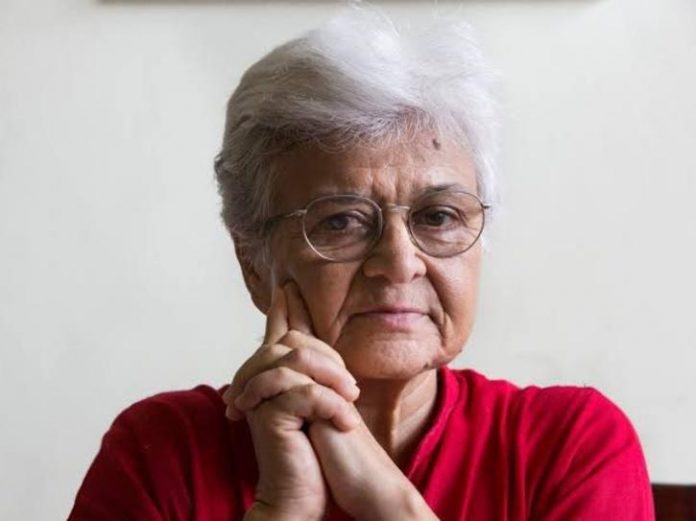Kamla Bhasin’s death at the age of 75 has left a wide gap in the women’s movement in South Asia. Her Azadi (freedom) chant however lives on and continues to be chanted across India and is more popular among the youth. Tributes continue to pour in on social media. Her personality created an impact wherever she went and interacted.
Nikhat Fatima | TwoCircles.net
Kamla Bhasin, renowned feminist activist, poet, author and social scientist passed away due to cancer on Saturday afternoon.
Kamla Bhasin was born on April 24, 1946, in present-day Pakistan and post-partition her family moved to Rajasthan from where she completed her studies and later studied sociology at the University of Munster, Germany.
She worked in an NGO in Rajasthan where she got first-hand in-depth information about caste-based discrimination which provided the foundation for her further work in the field of the feminist movement and social development works she contributed towards – not just in India but across South Asia.
Her perspectives changed when she had moved to Bangladesh to work in Gonoshasthaya Kendra – a rural NGO; where she met Zafrullah Chowdhury, a Bangladeshi public health worker and activist.
She worked with the United Nations wing of the Food and Agriculture Organization for more than 2 decades and quit her job in 2002. In the same year, she founded the South Asian feminist network Sangat, which works with underprivileged women from rural and tribal communities.
She was one of the founders of Jagori, a civil society organization working for women’s empowerment in Delhi.
Kamla Bhasin was very popular and respected among activists and peace workers in South Asia.
She authored several books on gender norms, including What is Patriarchy, Feminism & Its Relevance in South Asia, Borders & Boundaries: Women in India’s Partition, Understanding Gender, Laughing Matters and also many poems. Her recent work Satrangi Ladke and Satrangi Ladkiyan was written in 2020.
Through her works, she envisioned a gender-just society and her poems were the voice of the voiceless women. She also coined some popular slogans one of which is ‘Hum Bharat ki Nari hain, Phul Nahin, Chingari hain!’ (We are the women of India, not flowers but sparks). Her poem ‘Kyunki main ladki hoon, mujhe padhna hai’ (Because I am a girl, I have to study) gained immense popularity for speaking up for all girls and women and touched a chord with every girl.
Another popular slogan that has become a rage in the current times is ‘Azadi’ which Kamla Bhasin chanted as ‘Azadi from Patriarchy’. Today the word Azadi has become a rallying cry of freedom from poverty, atrocity, injustice and all forms of discrimination and atrocities.
Bhasin shared in one of her interviews that she had first heard the slogans of Azadi in Pakistan, where she is widely known and respected among activists. It was chanted during the reign of Pakistan’s military dictator Zia-ul-Haq as Aurat ka naara – azadi / Bachchon ka naara – azadi / Hum leke rahenge – azadi / Hai pyara naara – azadi.”
She was also one of the coordinators for India of the One Million Rising, a global campaign to end rape and sexual violence against women.
She conducted several workshops that inspired and motivated scores of women.
Her death has left a wide gap in the women’s movement in South Asia. Her Azadi chant however lives on and continues to be chanted across India and is more popular among the youth. Tributes continue to pour in on social media. Her personality created an impact wherever she went and interacted.


